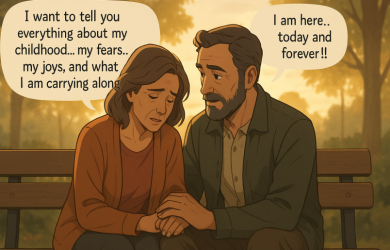10 Tips to Become More Vulnerable in Your Relationship

Heal & Grow Daily for a Happier Relationship
Subscribe FREEKey Takeaways
Marriage.com AI Quick Summary
Science has found many benefits from experiencing social connections in our lives.
Recent research has presented significant evidence that social support and feeling connected can help people maintain a healthy body mass index, control blood sugars, improve cancer survival, decrease cardiovascular mortality, decrease depressive symptoms, mitigate posttraumatic stress disorder symptoms, and improve overall mental health.
Having true connection and support in relationships is associated with living longer, healthier habits, improved physical health, and achieving more meaning in life.
To gain all those benefits of connection, we need to feel truly intimate, which implies being vulnerable.
What does it mean to be vulnerable in a relationship?
Being vulnerable in relationships means inviting your partner to know all sides of your personality – fears, feelings, thoughts, flaws, and challenges.
Without revealing who you are, you can’t achieve true intimacy and feel accepted for who you are.
Being vulnerable is the path to being known, accepted, and loved, as Brene Brown shares in her Ted talk on the power of vulnerability.
However, despite being drawn to connecting with others and having experienced advantages, many of us are still dreading vulnerability.
So, how to be more vulnerable in relationships?
1. Understand why is it difficult to open up
Why we fear vulnerability and intimacy is deeply personal and unique. Vulnerability issues in relationships are often tied to previous relationships, often dating back to our primary caregivers.
As children, we are great observers, and we learn about the world and ourselves by watching. If a parent was neglectful, we might feel like a burden when needing something.
Perhaps they were too critical or controlling, so we feel like nothing is good enough.
Whatever the case is, we end up feeling that no matter what, “it is not good to be me.”
Expecting you will NOT be accepted for who you are led to having a fear of being vulnerable in relationships.
Understanding your guard from vulnerability in relationships can help you work with it, not against it.
2. Enrich your emotional vocabulary
Not knowing how to define what you are experiencing can prevent you from sharing. To avoid being vulnerable and confused, you choose to avoid sharing at all.
Therefore, it might be helpful to practice the verbal expression of your emotion. Once you verbalize it, try to come up with two more descriptions.
By doing this, chances of vulnerability in love increase since you will be able to describe your inner world with more ease and color.
3. Practice mindfulness & slow down
A part of learning how to be more open in a relationship is learning to be present with our own emotions and with what our partner is sharing.
Emotional connection and vulnerability in relationships increase when we are willing to hear what our partner is saying, and devote time and attention to the fleeting moment.
Slowing down and practicing mindfulness keeps you close to your partner and your own inner experiences, and this fosters vulnerability.
4. Seek what you need
When we are in distress, it can be easy to dismiss our feelings and not speak up about what we need.
This is one way to prevent further hurt, although it prevents you from achieving true healing through vulnerability and intimacy.
Being willing to speak up when you need help and lean on others for support is a great way to become more connected.
5. Take it slow and gradually
It is not easy being vulnerable with a man or woman, even if they are a perfect partner. You can trust them, and still feel reluctant to open up.
It takes time to break through years of shielding yourself from vulnerability in relationships. The best you can do is follow your own pace in opening up through small steps.
6. Choose whom to open up to
Love and vulnerability can bring so much joy and fulfillment. This has greater chances of happened when we choose adequately the person to be revealed with.
Is vulnerability good in a healthy relationship? Yes, when it is not forced and when it is appreciated.
At the beginning of learning to open up, you might not know how to filter people and information you want to share. That is why taking it slowly and gradually is important.
7. Share your authentic thoughts and feelings
Honesty is an integral part of vulnerability in relationships. If you want to feel appreciated for who you are, you need to show your authentic self.
In addition to expressing your needs and wants, you should be honest about your perspective and take on things.
Vulnerability flourishes in an open exchange environment where we can say what we feel and think, giving and receiving feedback without defensiveness, while respecting others.
8. Keep practicing and be honest about your struggles
The practice is what will help you master the skill of being vulnerable, and being honest about your struggles is what will help you survive.
To receive compassion and support from others, we need to open up about the bumps we are experiencing.
Communicating what you are going through is a helpful compass for others to know how to help you.
9. Learn from others
If you are looking to understand how to be vulnerable in relationships, observe more carefully.
Whether you google “being vulnerable in relationships examples” or go knocking on friend’s doors asking for their story, listen to how others made it work.
We all struggle with vulnerability to a certain extent, and those struggles can be lessons you needn’t acquire on your own.
10. Look for help
Psychological patterns and defense mechanisms are not easy to understand, and seeking professional help makes the ride smoother.
An empathetic professional ear can hear more than you can when pondering or sharing it with a friend.
They can help you learn to open up or support you on a journey of learning how to get someone to open up emotionally when you uncover what you do and why you can look for alternatives that fit you better.
Combine vulnerability with wisdom
There is no true connection without vulnerability. Fear from being open can prevent us from achieving it.
Previous experiences of opening up that didn’t turn out so well, or from imagining scenarios that could happen could stop us from sharing. Comprehending “the why” of your fear can help you resolve it.
Vulnerability in relationships requires us to sit with what is happening in the here and now instead of spending all the time in our heads. Also, being vulnerable means sharing what you think, feel, and need.
Follow the pace that suits you and share with people you deem trustworthy to increase the chances of success when sharing goes well, the possibility of revealing more of yourself in the future increases.
Be mindful, ask for help, share gradually, and you will reap the benefits of being vulnerable and connected with people.
Want a healthier, happier relationship - one step at a time?
 Tips
Tips
Write your tip or submit a video tip
All tips are reviewed before the publishing.
Share this article on
Related Articles
Recent Articles
Related Quizzes
Heal & Grow Daily for a Happier, Healthier Relationship
Subscribe FREE on YouTube We'd love your feedback!
We'd love your feedback!
 Expert Q&A
Expert Q&A
Ask your question related to this topic & get the support you deserve from experts.

 Reviewed by
Reviewed by
















 Thanks for your feedback!
Thanks for your feedback!